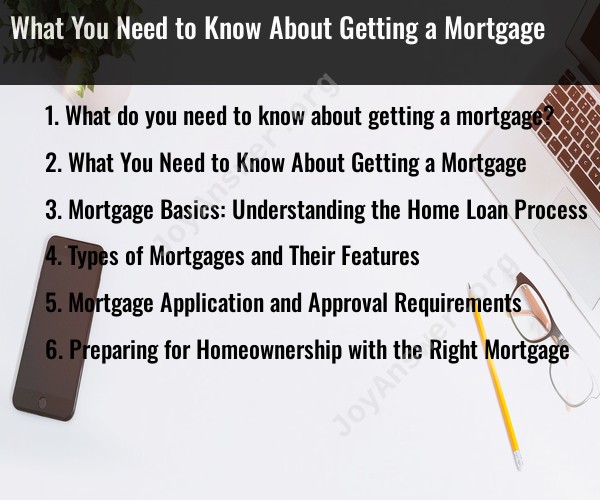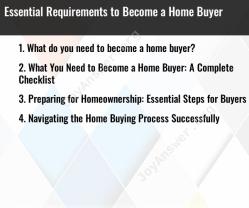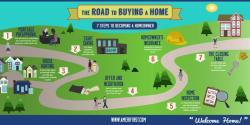What do you need to know about getting a mortgage?
Getting a mortgage is a significant financial decision, and there are several key things you need to know before you start the process. Here are the essential points to consider:
Credit Score and Credit History:
- Lenders will assess your creditworthiness. A good credit score and history can help you qualify for better mortgage terms and lower interest rates.
Budget and Affordability:
- Determine how much you can afford for a mortgage payment, including property taxes, insurance, and maintenance costs. Use online calculators to estimate monthly payments.
Down Payment:
- Save for a down payment, typically around 20% of the home's purchase price. A larger down payment can lower your monthly payments and may help you avoid private mortgage insurance (PMI).
Mortgage Types:
- Learn about different mortgage types, such as fixed-rate, adjustable-rate, FHA, VA, and USDA loans. Each has its own features and eligibility criteria.
Interest Rates:
- Understand how interest rates work and how they can affect your monthly payments. Shop around for the best mortgage rates from different lenders.
Pre-Approval:
- Get pre-approved for a mortgage to understand how much you can borrow and to strengthen your position as a buyer when making an offer on a home.
Closing Costs:
- Be aware of the various closing costs associated with a mortgage, including fees for appraisals, inspections, title insurance, and attorney services.
Mortgage Terms:
- Know the length of the mortgage term (e.g., 15, 20, or 30 years) and the implications this has on your monthly payments and overall interest costs.
Affordability vs. Loan Approval Amount:
- Just because a lender approves you for a certain loan amount doesn't mean it's affordable for your budget. Be cautious and don't overextend yourself financially.
Documentation:
- Prepare the necessary financial documentation, including tax returns, pay stubs, bank statements, and other proof of income and assets.
Mortgage Process Timeline:
- Understand the typical timeline for the mortgage process, from pre-approval to closing. Delays can happen, so be patient.
Insurance Requirements:
- Know the insurance requirements for your mortgage, including homeowners insurance, and, in some cases, private mortgage insurance (PMI).
Loan Prepayment and Penalties:
- Inquire about prepayment options and whether there are penalties for paying off the mortgage early.
Legal Advice:
- Consider seeking legal advice if you have complex legal questions or concerns, particularly during the closing process.
Consult a Mortgage Professional:
- It's often a good idea to consult with a mortgage professional, such as a mortgage broker or loan officer, who can guide you through the process and help you find the best mortgage for your situation.
Remember that buying a home and obtaining a mortgage is a major financial commitment. It's crucial to be well-informed, make careful financial decisions, and consider seeking professional advice when necessary to ensure a successful and sustainable homeownership experience.
What You Need to Know About Getting a Mortgage
Getting a mortgage is a big step in the home buying process. It's important to understand the basics of mortgages, the different types of mortgages available, and the requirements for approval. Here's what you need to know:
Mortgage Basics
A mortgage is a loan that you take out from a lender to purchase a home. The lender will hold a lien on your home until the loan is repaid. You will make monthly payments to the lender, which will include principal (the amount of money you borrowed), interest (the cost of borrowing money), and property taxes and homeowners insurance.
Types of Mortgages
There are many different types of mortgages available, each with its own features and benefits. Some of the most common types of mortgages include:
- Fixed-rate mortgage: This type of mortgage has a fixed interest rate for the entire term of the loan. This means that your monthly payments will be the same each month, regardless of changes in the market interest rate.
- Adjustable-rate mortgage (ARM): This type of mortgage has an interest rate that can adjust periodically, typically every year or every five years. This means that your monthly payments could go up or down over time.
- Conventional mortgage: This type of mortgage is not backed by the government. Conventional mortgages typically require a down payment of at least 20% of the purchase price of the home.
- FHA loan: This type of mortgage is insured by the Federal Housing Administration (FHA). FHA loans typically require a down payment of as little as 3.5% of the purchase price of the home.
- USDA loan: This type of mortgage is guaranteed by the United States Department of Agriculture (USDA). USDA loans are available to low-income borrowers who are purchasing a home in a rural area.
Mortgage Application and Approval Requirements
To apply for a mortgage, you will need to provide the lender with a variety of documentation, including:
- Income tax returns: The lender will use your income tax returns to verify your income and employment history.
- Pay stubs: The lender will use your pay stubs to verify your current income.
- Bank statements: The lender will use your bank statements to verify your assets and to make sure that you have a sufficient down payment.
- Credit report: The lender will use your credit report to assess your creditworthiness.
The lender will also consider your debt-to-income ratio (DTI). Your DTI is the ratio of your monthly debt payments to your monthly income. A DTI of 36% or less is generally considered to be a good DTI for borrowers.
Preparing for Homeownership with the Right Mortgage
Before you apply for a mortgage, it's important to prepare for homeownership. This includes:
- Getting your finances in order. Make sure that your credit score is good and that you have a low DTI.
- Saving for a down payment. The more money you can put down on your home, the lower your monthly payments will be.
- Researching different mortgage options. Compare the interest rates, terms, and features of different mortgages to find the best one for you.
Once you are ready to apply for a mortgage, it's important to shop around and compare offers from multiple lenders. This will help you to find the best mortgage for your needs.
Getting a mortgage can be a complex process, but it doesn't have to be overwhelming. By understanding the basics of mortgages and by being prepared, you can get the mortgage you need to purchase your dream home.












